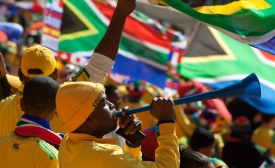human rights
Today marks one month since the assassination of journalist Javier Valdéz Cárdenas, which shook the international press community and further exemplified the pervasive violation of press freedom in Mexico. Winner of the Committee to Protect Journalists’ 2011 International Press Freedom Award, Valdéz was murdered on May 15 in broad daylight near the Ríodoce office, the local weekly publication he founded in the Mexican state of Sinaloa.
Now that Qatar is embroiled in controversy with nearly the entire Sunni Islamic world, led by Saudi Arabia, the 2022 FIFA World Cup is suddenly at risk. The Qatar World Cup has been dogged by controversy since the day it was announced in 2012. But even years of international and humanitarian moral outrage could not do to Qatar what Saudi Arabia proved able to do almost instantly: isolate Qatar’s ruling emir and take away his biggest soft-power achievement.

A new article explores how South Africa’s soft power is undermined by domestic issues such as racial tension and poverty.
Three years into the war in Ukraine, international attention and aid to displaced people has waned. In an area near the war zone, Natasha Bluth reports on volunteer groups trying to fill gaps in support for one of the world’s largest internally displaced populations.Many Ukrainian community organizations, inspired by the Euromaidan protests that called for improved human rights and better ties with Europe, have expanded since the conflict began, including local NGO Ulybka rebenka, or Smile of a Child, which was founded a year earlier to aid disadvantaged children.
Australian officials have been working hard to secure one of two seats on the United Nations Human Rights Council for the 2018-2020 term, pushing at international forums for voting countries to back their bid. [...] Just six months ago, during his visit to Australia, Special Rapporteur for the Office of the U.N. High Commissioner for Human Rights François Crépeau said Australia’s human rights standing had been tarnished by its “regressive” migration policies falling behind international standards. Treatment of migrants by boat “served to erode their human rights.”
A new report shows only a small fraction of official development assistance goes toward ending violence against children. For the first time, a review of official development assistance (ODA) to end violence against children has been done. The report Counting Pennies found that in 2015, total ODA spending was $174 billion and of that, less than 0.6 per cent was allocated to ending violence against children. Civil society partners that collaborated on this report were World Vision International, SOS Children’s Villages, Save the Children and ChildFund Alliance.
The Duterte administration turned down 250 million euros worth of development aid from the European Union (EU) because it “may be used as the reason for interfering in the internal affairs of the country,” a Cabinet official familiar with the issue said. The high level source, who only agreed to speak under anonymity, told the Inquirer that the move aims to block the EU from questioning how the Philippines adopts and follows the rule of law, including respect for human rights.
Switzerland has given an insight into why it was part of the negotiation that led to the release of the 82 Chibok girls abducted three years ago by the terror group, Boko Haram. According to a news report published yesterday by a UK newspaper, IBTimes UK, the Swiss government said its involvement in the negotiation with Boko Haram was a result of a request from the Nigerian government, in addition to “humanitarian concerns.”







